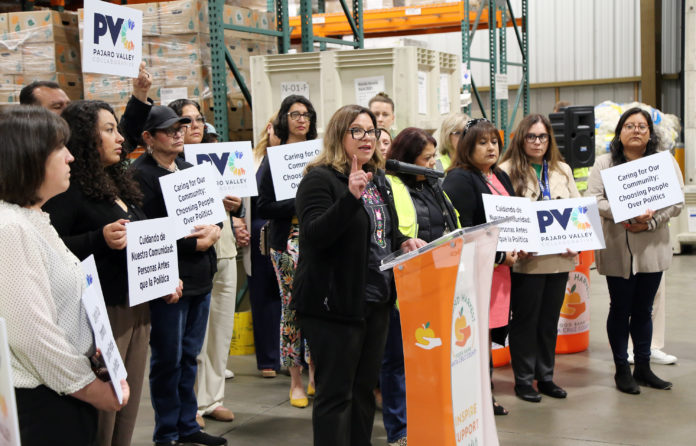
If cuts to food assistance programs proposed under President Donald Trump’s “Big, Beautiful Bill” are approved by the U.S. Senate, it would cripple the food distribution system that local organizations have spent decades building, and upon which thousands Santa Cruz County residents rely.
That was the message Monday from Pajaro Valley Collaborative, a group of nonprofit organizations that gathered at Second Harvest Food Bank (SHFB) for a “call to action” to the community, asking everyone to call their elected leaders and demand that they fight passage of the bill.
“The proposal before the Senate is not just a budgetary decision, it’s a moral one,” said Community Bridges spokesman Tony Nuñez.
The bill, Nuñez said, would mean that more children would go to school hungry, affecting their ability to perform well in school.
“It means that more parents would face the impossible choice between paying rent and buying groceries, and homelessness will increase,” he said.
The U.S. House of Representatives has already approved $300 billion in cuts to the Supplemental Nutrition Assistance Program (SNAP), called CalFresh in California. The Senate is currently debating it. It would be the largest cut in the program’s history, said SHFB CEO Erica Padilla-Chavez.
Its passage would further burden a human services system already straining at the seams.
“Programs like SNAP and CalFresh are the first lines of defense against food insecurity in our community,” she said. “Your food bank is the second line of defense.”
SHFB distributes food to more than 71,000 people monthly, with one in three county residents considered food insecure.
If the bill passes—and an estimated 44,400 people lose their CalFresh benefits in Santa Cruz County—it will put more strain on the food bank, in addition to programs such as Meals on Wheels and Women, Infants and Children (WIC) program run by the California Department of Public Health, Nuñez said.
“SNAP is the foundation that supports the rest of our food system,” he said. “When that structure is stripped away, the entire structure weakens.”
And that would have a ripple effect on those programs.
“And we may be forced to take the unthinkable step of dis-enrolling seniors who currently depend on us,” Nuñez said. “Food should not be a privilege. Nutrition is a human right.”
Padilla-Chavez said that opposing the proposed cuts is a way to show appreciation and compassion for the people whose work makes up the backbone of the local economy.
“The diversity of our community is what’s been making us strong,” she said. “And that includes immigrants. And nourishing individuals that are providing for our care, that are picking our crops, that are taking care of our hospitality industry and help our economy be what it is in Santa Cruz County is a moral imperative.”












It is unfortunate for those who actually need the help. Consider what the private sector companies have to do, and tighten your belt.
This is what the voters of Felon Trump and the GOP want. They want to starve kids and make them hungry to fatten their own wallets.
Seek help. Your TDS is causing you to post idiotic comments.
The Psychology of Trump Derangement Syndrome
https://therapygroupdc.com/therapist-dc-blog/the-psychology-of-trump-derangement-syndrome/
Get well soon.